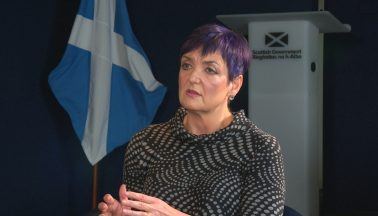Scotland would have to make “difficult fiscal adjustments” in the years after independence, a new report has said.
The Institute for Government (IfG), said Scotland’s deficit will likely be worse than the 7.7% of GDP reported in 2018-19 due to the Covid-19 pandemic, adding that the effect of the last year “could be lasting” on public finances.
While the IfG admits it is not clear what an independent Scotland’s fiscal position would be and that would be dependent on negotiations with the UK Government on issues like how much debt should the country be left with, the think tank says the current level of deficit, paired with maintaining the current level of public spending “would not be sustainable” if Scotland leaves the UK.
The report also said the fiscal outlook across the UK is likely to be worse for some time to come, adding it would be “reasonable to assume that the fiscal balance of all four will be even further into the red over the next five to 10 years than it was in 2018/19 without further action to raise taxes or cut spending”.
The report said: “There are many reasons why the people of Scotland or Wales might want to seek independence from the UK, or why the people of Northern Ireland might want to be part of a united Ireland.
“However, one cost of doing so would be that they would no longer be able to benefit from the redistribution of resources that currently takes place across the UK.
“The larger the deficit that they have is, the harder the case for independence becomes.”
To bring the deficit down, the IfG claims a newly-formed government of an independent Scotland would have to impose a combination of spending cuts and tax rises – most likely on immovable assets such as land or property – along with launching policies to boost the economy.
However, it said: “The figures presented in this report highlight the scale of the issues and emphasise the need that there would be after secession to go some way towards closing the gap between the revenues they generate and their levels of public spending.
“This would be possible to do but not without difficult decisions and trade-offs.”
Although the report said it would be easier for an independent Scotland to bring its deficit down to sustainable levels, compared to an independent Wales or Northern Ireland after reunification.
Gemma Tetlow, the author of the report and chief economist at the IfG, said: “Any advocates for breaking away from the UK must address the reality of the nations’ current fiscal imbalances and the difficult policy choices these would necessitate after secession.”
Scottish Tory economy spokesman Maurice Golden said the report “lays bare the chilling economic reality of ripping Scotland out of the UK”.
He added: “When all focus should be on recovery and rebuilding, this is reckless beyond belief. Deep down, Sturgeon must know the devastation this would cause.”
While anti-independence group Scotland in Union chief executive Pamela Nash said SNP leader Nicola Sturgeon should “come clean about what public services she would cut in an independent Scotland”.
Finance secretary Kate Forbes said: “The Scottish Government must balance its budget by law; it cannot overspend through borrowing as other governments can.
“Government Expenditure and Revenue Scotland represents Scotland’s situation as part of the union – not the finances of an independent country, when different choices can and will be made.
“When it comes to the finances of independence, as the Institute for Fiscal Studies has said, Scotland is a rich country – however, we don’t yet have full control over those many resources.
“The key issue is for Scotland to have all the powers needed to manage our own recovery, and the decisive way to deliver that is to re-elect Nicola Sturgeon by giving both votes to the SNP on May 6th.”
Follow STV News on WhatsApp
Scan the QR code on your mobile device for all the latest news from around the country


 iStock
iStock

























